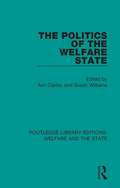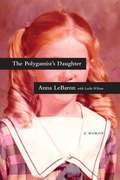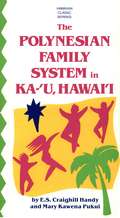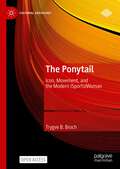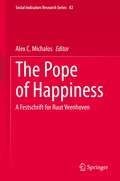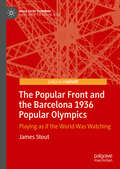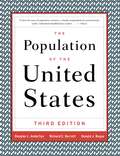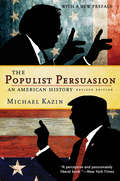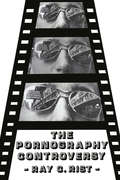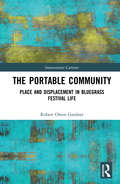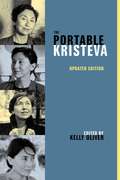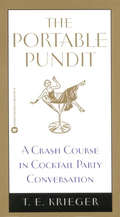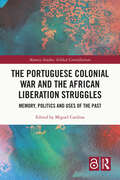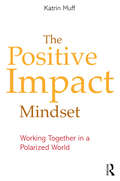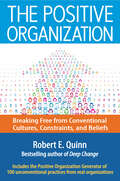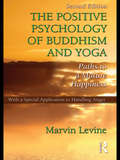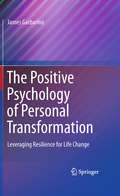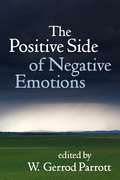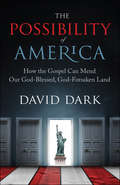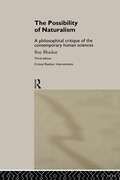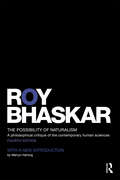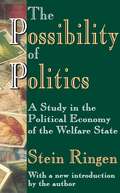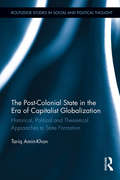- Table View
- List View
The Politics of the Welfare State (Routledge Library Editions: Welfare and the State #25)
by Ann Oakley Susan WilliamsOriginally published in 1994 The Politics of the Welfare State looks at how the privatization and marketization of education, health and welfare services in the past decade have produced a concept of welfare that is markedly different from that envisaged when the welfare state was initially created. Issues of class, gender and ethnicity are explored in chapters that are wide ranging but closely linked. The contributors are renowned academics and policy-makers, including feminist and welfare historians, highly regarded figures in social policy, influential critics of recent educational reforms and key analysts of current reform in the health sector.
The Polygamist's Daughter: A Memoir
by Anna LeBaron Leslie WilsonMy father had thirteen wives and more than fifty children . . . This is the haunting memoir of Anna LeBaron, daughter of the notorious polygamist and murderer Ervil LeBaron. Ervil’s criminal activity kept Anna and her siblings constantly on the run from the FBI. Often starving, the children lived in a perpetual state of fear—and despite their numbers, Anna always felt alone. Would she ever find a place she truly belonged? Would she ever be anything other than the polygamist’s daughter? Filled with murder, fear, and betrayal, The Polygamist’s Daughter is the harrowing, heart-wrenching story of a fatherless girl and her unwavering search for love, faith, and a place to call home.
The Polynesian Family System in Ka-'U, Hawai'i
by e. s. Craighill Handy Mary Kawena PukuiThis classic book on Hawaiian families and culture is an essential text for anyone interested in pre-American Hawaii.The Polynesian Family System in Ka-'U, Hawai'i is a collaboration of the distinguished scholars Dr. Mary Puku and Dr. E.S. Craighill Handy. <P><P> It provides us with this fascinating review of traditional Hawaiian life. Manners and customs relating to birth, death, marriage, sexual practices, religious beliefs, and family relationship are all clearly described. The main sources of information were elderly Hawaiian informants of then remote Kacu district of the island of Hawaii.This Hawaiian history and culture book provides professional scholars and laymen a like with an unrivaled picture of traditional Hawaiian society. Based on original work in the field with living Hawaiians, it combines research into the literature by two authors of unusual qualifications with field work conducted under unique circumstances. This edition will be welcomed by librarians, anthropologists, and indeed all who have a serious interest in Polynesian life.
The Ponytail: Icon, Movement, and the Modern (Sports)Woman (Cultural Sociology)
by Trygve B. BrochThis open access book adopts a cultural sociology of materiality to explore the hallmark of the female athlete: the ponytail. Studying a wealth of news articles about ponytails in sports and society, Broch uncovers this hairstyle’s polyvocality and argues that it is a total social phenomenon. By separating his approach from the cultural studies tradition, Broch highlights how hair is imbued with codes, narratives, and myth that allow its wearers to understand, maneuver, and criticize social gender relations in deeply personal ways. Using multiple theories about hair, bodies, myths, and icons, he creates a multidimensional method to show how icons are imitated and used. As women navigate their practical lives, health issues, and gendered expectations, the ponytail materializes their dynamic maneuvering of cultural and social environments. Sporting a ponytail—itself an embodiment of movement—is filled with a performativity of social movements: a cultural kinetics that is never apolitical.
The Poor Pay More: Consumer Practices of Low-Income Families
by David CaplovitzHas delineated with uncompromising, scientific evidence the brutal economic facts of existence for a group of low-income families in four New York City housing projects.
The Pope of Happiness: A Festschrift for Ruut Veenhoven (Social Indicators Research Series #82)
by Alex C. MichalosThis book honors the work of Ruut Veenhoven, who has been a pioneer and leader in the field of happiness studies for the past 50 years. It brings together experts in the field discussing Veenhoven’s work as well as taking up themes from his workshops over the years to analyze how and where the field has expanded following his research. Veenhoven’s contributions include developing theories and measuring instruments, creating the world’s first and largest database of happiness research, founding the world’s first and most frequently cited Journal of Happiness Studies, and student development in and popularization of the field of happiness studies. He has extensive publications through the International Sociological Association and the International Society for Quality of Life Studies, and the research field of happiness studies would not have become as broad today without his enormous contributions. Friends and former students of Veenhoven provide both academic and anecdotal discussions in this festschrift, which is important for anyone interested in the development of happiness research.
The Popular Front and the Barcelona 1936 Popular Olympics: Playing as if the World Was Watching (Mega Event Planning)
by James StoutThis book deals with the events leading up to the 1936 Popular Olympics which would have united the Popular Front in opposition to the Berlin Olympics. It also discusses the days after the outbreak of the Spanish Civil War which began on the same day the games were due to start. Using a variety of primary and secondary sources, the book traces the biographies of several Popular Olympians who would go on to volunteer in the Spanish Civil War. The book also examines the planned events and locations for the Popular Olympics as well as the international funding that the games secured. The book argues that the events were a departure from Workers’ Sport as well as the IOC’s Olympic games and represented an important cultural manifestation of the Popular Front.
The Population of the United States (3rd edition)
by Douglas L. Anderton Richard E. Barrett Donald J. BogueThis third edition, written with two new coauthors, combines 1990 census data with information from the Current Population Survey, the National Health Interview Survey, and numerous other sources, even including demographic data not available in any other published source.
The Populist Persuasion: An American History
by Michael KazinIn The Populist Persuasion, the distinguished historian Michael Kazin guides readers through the expressions of conflict between powerful elites and "the people" that have run through our civic life, filling it with discord and meaning from the birth of the United States until the present day. Kazin argues persuasively that the power of populism lies in its adaptable nature. Across the political spectrum, commentators paste the label on forces and individuals who really have just one big thing in common: they are effective at blasting "elites" or "the establishment" for harming the interests and betraying the ideals of "the people" in nations that are committed, at least officially, to democratic principles. Kazin’s classic book has influenced debates over populism since its publication. The new preface to this edition brings the story up to date by charting the present resurgence of populist discourse, which was front and center in the 2016 elections and in the Brexit debate.
The Pornography Controversy: Changing Moral Standards in American Life
by Ray RistDiscusses governmental responsibilities and individual liberties, ethical problems of moral judgement, and legal considerations in defining and suppressing obscene material.
The Portable Community: Place and Displacement in Bluegrass Festival Life (Interactionist Currents)
by Robert Owen GardnerThis book explores the various ways in which individuals use music and culture to understand and respond to changes in their natural and built environments. Drawing on over 15 years of ethnographic fieldwork, interviews, and participant observation, the author develops the thesis that the relationships, networks, and intimate forms of social interaction in the “portable” community cultivated at bluegrass festival events are significant cultural formations that shape participants’ relationships to their localities. With specific attention to the ways in which the strength of these relationships are translated into meaningful sites of community identity, place, and action following devastating local floods that destroyed homes and businesses, displacing residents for years, The Portable Community: Place and Displacement in Bluegrass Festival Life sheds light on the strength of such communities when tested and under external threat. A study of the central role of arts and music in grappling with social and environmental change, including their role in facilitating disaster relief and recovery, this volume will appeal to scholars of sociology with interests in symbolic interactionism, the sociology of music, culture, and the sociology of disaster.
The Portable Kristeva (European Perspectives: A Series in Social Thought and Cultural Criticism)
by Julia KristevaAs a linguist, Julia Kristeva has pioneered a revolutionary theory of the sign in its relation to social and political emancipation; as a practicing psychoanalyst, she has produced work on the nature of the human subject and sexuality, and on the "new maladies" of today's neurotic. The Portable Kristeva is the only fully comprehensive compilation of Kristeva's key writings. The second edition includes added material from Kristeva's most important works of the past five years, including The Sense and Non-Sense of Revolt, Intimate Revolt, and Hannah Arendt. Editor Kelly Oliver has also added new material to the introduction, summarizing Kristeva's latest intellectual endeavors and updating the bibliography.
The Portable Pundit: A Crash Course in Cocktail Party Conversation
by T. E. KriegerWant to amaze and astound party guests with witty repartee, dazzling erudition, and conversational savvy? "The Portable Pundit" covers questions like: What is that whole Director's Cut thing about? Into which Circle of Hell might you place Homer Simpson? How can I use adjectives like "Proustian" and "Joycean"? What influence did Plato have on the film The Matrix? From Art History to Philosophy, Wall Street to the Internet, "The Portable Pundit" has it covered.
The Portuguese Colonial War and the African Liberation Struggles: Memory, Politics and Uses of the Past (Memory Studies: Global Constellations)
by Miguel CardinaThe Portuguese Colonial War and the African Liberation Struggles: Memory, Politics and Uses of the Past presents a critical and comparative analysis on the memory of the colonial and liberation wars that led to a regime change in Portugal and to the independence of five new African countries: Angola, Mozambique, Guinea-Bissau, Cape Verde and São Tomé and Príncipe. Covering more than six decades and based on original archival research, critical analysis of sources and interviews, the book offers a plural account of the public memorialization of this contested past in Portugal and in former colonized territories in Africa, focusing on diachronic and synchronic processes of mnemonic production. This innovative exercise highlights the changing and crossed nature of political memories and social representations through time, emphasizing three modes of mnemonic intersections: the intersection of distinct historical times; the intersection between multiple products and practices of memory; and the intersection connecting the different countries and national histories. The Portuguese Colonial War and the African Liberation Struggles: Memory, Politics and Uses of the Past is the major and final output of the research developed by CROME – Crossed Memories, Politics of Silence, a project funded by a Starting Grant (715593) from the European Research Council (ERC). The book advances current knowledge on Portugal and Africa and deepens ongoing conceptual and epistemological discussions regarding the relationship between social and individual memories, the dialectics between memory, power and silence, and the uses and representations of the past in postcolonial states and societies.
The Portuguese in Canada
by Victor M.P. Da Rosa Carlos TeixeiraEven though the Portuguese are relatively new to Canada, they have made major contributions to the cultural mosaic of the country. Containing many new essays, this second edition of The Portuguese in Canada updates the work that filled a gap in the scholarly literature of multiculturalism in Canada. The contributors come from a variety of disciplines - anthropology, geography, history, literature, linguistics, sociology, and urban planning - and are from Portugal, Canada and the United States. Essays examine the history of the Portuguese diaspora, the Portuguese presence in Newfoundland and its fisheries, language and identity, urban experiences (especially in Montreal and Toronto), and history and literature. This second edition of The Portuguese in Canada conveys the multi-faceted contributions the Portuguese have made to Canada and considers possible future growth and development of Portuguese-Canadian culture and heritage.
The Positive Impact Mindset: Working Together in a Polarized World
by Katrin MuffWe are facing a new and urgent challenge when collaborating across organizations, and with broader stakeholder groups: how to overcome polarization. It has never been harder to find a common vision, when opinions are often considered as facts. This book empowers changemakers and business leaders to understand how successful organizations in the 21st century require leaders to become fluent in collaborating outside of traditional business boundaries. Such collaboration often involves working with parties that hold very different values, opinions and priorities, and working with them requires new skills. Building on the book Five Superpowers for Co-Creators, Katrin Muff presents a number of real-world examples that demonstrate how organizations have successfully managed to address these challenges. Examples of such unlikely but successful cross-sector collaboration include a project addressing plastic waste in Switzerland, and two European city government projects that reached out beyond organizational boundaries. The book features many stories of trial and error in overcoming the societal polarization gap. From all these insights emerges clear guidance as to how leaders and organizations can transform to new ‘outside-in’ mindsets to overcome polarization and develop a Positive Impact Mindset. The book is ideal for use by facilitators, educators, business and political leaders, and consultants, who are seeking solutions within an often polarized world to achieve sustainable change and a positive impact.
The Positive Organization: Breaking Free from Conventional Cultures, Constraints, and Beliefs
by Robert E. QuinnBeholden to accepted assumptions about people and organizations, too many enterprises waste human potential. Robert Quinn shows how to defy convention and create organizations where people feel fully engaged and continually rewarded, where both individually and collectively they flourish and exceed expectations.The problem is that leaders are following a negative and constraining "mental map" that insists organizations must be rigid, top-down hierarchies and that the people in them are driven mainly by self-interest and fear. But leaders can adopt a different mental map, one where organizations are networks of fluid, evolving relationships and where people are motivated by a desire to grow, learn, and serve a larger goal. Using dozens of memorable stories, Quinn describes specific actions leaders can take to facilitate the emergence of this organizational culture—helping people gain a sense of purpose, engage in authentic conversations, see new possibilities, and sacrifice for the common good. The book includes the Positive Organization Generator, a tool that provides 100 real-life practices from positive organizations and helps you reinvent them to fit your specific needs. With the POG you can identify and implement the practices that will have the greatest impact on your organization. At its heart, the book helps leaders to see new possibilities that lie within the acknowledged realities of organizational life. It provides five keys for learning to be "bilingual"--speaking the conventional language of business as well as the language of the positive organization. When leaders can do this, they are able to make real and lasting change.
The Positive Psychology of Buddhism and Yoga: Paths to A Mature Happiness
by Marvin LevineThis book describes Buddhist-Yogic ideas in relation to those of contemporary Western psychology. The book begins with the Buddhist view of the human psyche and of the human condition. This leads to the question of what psychological changes need to be made to improve that condition. Similarities between Buddhism and Western Psychology include: Both are concerned with alleviating inner pain, turmoil, affliction and suffering. Both are humanistic and naturalistic in that they focus on the human condition and interpret it in natural terms. Both view the human being as caught in a causal framework, in a matrix of forces such as cravings or drives which are produced by both our biology and our beliefs. Both teach the appropriatenss of compassion, concern and unconditional positive regard towards others. Both share the ideal of maturing or growth. In the East and the West, this is interpreted as greater self possession, diminished cravings and agitations, less impulsivity and deeper observations which permit us to monitor and change our thoughts and emotional states. Buddhism, Yoga, and Western Psychology, especially the recent emphasis on positive psychology, are concerned with the attainment of deep and lasting happiness. The thesis of all three is that self-transformation is the surest path to this happiness.
The Positive Psychology of Personal Transformation
by James GarbarinoThis book reveals the social basis for moral development in adversity, and the mental and physical benefits of psychological and spiritual growth. Drawing widely on the author's experiences, the book has vast significance across the healing disciplines.
The Positive Side of Negative Emotions
by W. Gerrod ParrottThis unique volume brings together state-of-the-art research showing the value of emotions that many believe to be undesirable. Leading investigators explore the functions and benefits of sadness, anxiety, anger, embarrassment, shame, guilt, jealousy, and envy. The role of these emotions in social interactions and relationships is examined, as are cultural differences in how they are valued and expressed. The volume considers how people seek out these feelings in everyday life to improve performance, gain insight, and express cares and commitments. Negative emotions are shown to have an important place in a rich and meaningful life.
The Possibility of America: How The Gospel Can Mend Our God-blessed, God-forsaken Land
by David DarkPublished in the years following 9/11, David Dark’s book The Gospel according to America warned American Christianity about the false worship that conflates love of country with love of God. It delved deeply into the political divide that had gripped the country and the cultural captivity into which so many American churches had fallen. <P><P> In our current political season, the problems Dark identified have blossomed. The assessment he brought to these problems and the creative resources for resisting them are now more important than ever. Into this new political landscape and expanding on the analysis of The Gospel according to America, Dark offers The Possibility of America: How the Gospel Can Mend Our God-Blessed, God-Forsaken Land. Dark expands his vision of a fractured yet redeemable American Christianity, bringing his signature mix of theological, cultural, and political analysis to white supremacy, evangelical surrender, and other problems of the Trump era.
The Possibility of Naturalism: A philosophical critique of the contemporary human sciences
by Roy BhaskarSince its original publication in 1979, The Possibility of Naturalism has been one of the most influential works in contemporary philosophy of science and social science. It is one of the cornerstones of the critical realist position, which is now widely seen as offering perhaps the only viable alternative to positivism and post-modernism. This revised edition includes a new foreword.
The Possibility of Naturalism: A philosophical critique of the contemporary human sciences (Critical Realism Ser.)
by Roy BhaskarSince its original publication in 1979, The Possibility of Naturalism has been one of the most influential works in contemporary philosophy of science and social science. It is one of the cornerstones of the critical realist position, which is now widely seen as offering perhaps the only viable alternative to positivism and post positivism. This fourth edition contains a new foreword from Mervyn Hartwig, who is founding editor of the Journal of Critical Realism and editor and principal author of the Dictionary of Critical Realism.
The Possibility of Politics: A Study in the Political Economy of the Welfare State
by Stein RingenThe Possibility of Politics explores the power of political reform, specifically reform of the modern welfare state. Can reform be effective if limited to cautious and piecemeal interventions that avoid radicalism and revolution? Can it also avoid unwanted consequences? Will the welfare state survive in the future?Stein Ringen views the welfare state as a large-scale experiment in political reform. To ask if the welfare state works is to ask if political reform is possible at all. By its nature, the welfare state is reform on a grand scale, for it attempts to change the circumstances individuals and families live under without changing and disrupting society itself. But is it realistic to believe a population can get together, set goals and then try to meet these goals through collective actions, specifically public policies, without causing unintended consequences and destroying the state in the process? The welfare state attempts, idealistically, to redistribute welfare without reshaping the economic processes that cause inequities in the first place. Ringen considers how well redistribution has met the test in terms of political legitimacy, its intended effects on poverty and inequality, as well as its undesired and unintended effects on economic efficiency and the quality of private life. Ultimately, does the welfare state work? Further, is the welfare state a good thing?In considering these questions, The Possibility of Politics should be of particular value to academics and advanced students interested in political theory, public economics, social administration, and political sociology.Stein Ringen is professor of sociology and social policy at Oxford University and a Fellow of Green College. He teaches social and political theory and research methodology for graduates in social policy, sociology, politics, economic and social history and other subjects.
The Post-Colonial State in the Era of Capitalist Globalization: Historical, Political and Theoretical Approaches to State Formation (Routledge Studies in Social and Political Thought)
by Tariq Amin-KhanState formation in post-colonial societies differed greatly from the formation of the Western capitalist state. The latter has been extensively studied, while a coherent grasp of the post-colonial state has remained elusive. Amin-Khan provides a critical historical and contemporary understanding of post-colonial state formations in Asia and Africa, and suggests how this process differed from the formation of states in Latin America. In distinguishing between the post-colonial state and the Western capitalist state, the author argues that the unitary colonial state left a strong legacy on the decolonized states of Asia and Africa, reinscribing their subordination vis-à-vis Western states, transnational corporations and multilateral institutions. The indigenous elites' decision at the time of decolonization to retain colonial state structures meant the readaptation of capitalism-imperialism nexus to suit new post-colonial realities, which enabled the formation of clientelist relationships. This post-colonial reality and exploration of the contemporary context provides the basis of analyzing two post-colonial state forms, the capitalist and proto-capitalist varieties, which are examined using the case studies of India and Pakistan.
